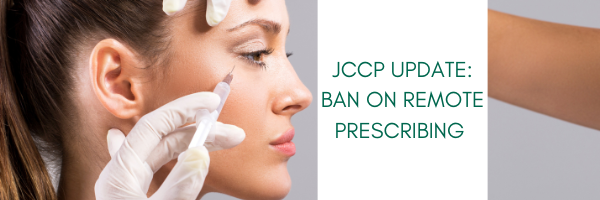The Joint Council for Cosmetic Practitioners otherwise known as the JCCP was launched in 2018. The ‘not for profit’ organization was made to bring ‘self-regulation’ of the non-surgical aesthetic sector within the UK with a strong focus on patient safety.
Recently we published two blogs outlining the new guidelines from the JCCP, one of which was the new licensing scheme. A new breakthrough within the industry where any aesthetic treatments performed without the legal licensing required would be considered an offence. The licensing scheme is to protect the general public by practitioners needing to show a certain standard of understanding along with premises standards.
Since this was announced there has been further updated guidance in which cosmetic treatments, such as Botox and topical anaesthetic will no longer be allowed to be remotely prescribed.
The press release published by the JCCP states:
In line with several Professional Statutory Regulators (the General Medical Council and the General Dental Council and in accordance with guidance set down by the Royal Pharmaceutical Society) the JCCP and the CPSA have set down their decision not to endorse or permit the remote prescribing of any prescription medicine when used for specifically for non-surgical cosmetic treatments. In such circumstances when a prescriber delegates treatment to other practitioners, then the JCCP would remind the prescriber that the patient remains under the oversight of the prescriber, requiring that the prescriber must be familiar with the patient through an initial face to face consultation and diagnostic assessment of the patient’s suitability for treatment. This applies to the routine/planned administration of medicines that are used specifically for cosmetic purposes, such as botulinum toxins, injected local anaesthetic or topical adrenaline, and the emergency use of medicines such as hyaluronidase.
Professor David Sines CBE – Executive Chair of the JCCP said,
“The JCCP recognises the important role that professional prescribers make to public protection and of the contribution that they make to the development and maintenance of a robust and effective patient safety culture in the aesthetic sector. The JCCP (and the CPSA) continue to strive to promote and develop standards and best practice across the whole of the non-surgical and hair restoration surgery sector and to promote and publicise the same to the public. The JCCP’s primary purpose is to raise public awareness and improve patient safety. The publication of our revised guidance on ‘Responsible Prescribing for Cosmetic Practitioners’ demonstrates our continuing commitment to signposting and promoting safe and effective practice within the aesthetic sector. We have worked closely with a range of statutory regulators and professional associations over the past three years to promote safe and effective practice in prescribing. We commend the adoption and application of this revised Guidance Statement in accordance with our shared aim of protecting the public”








